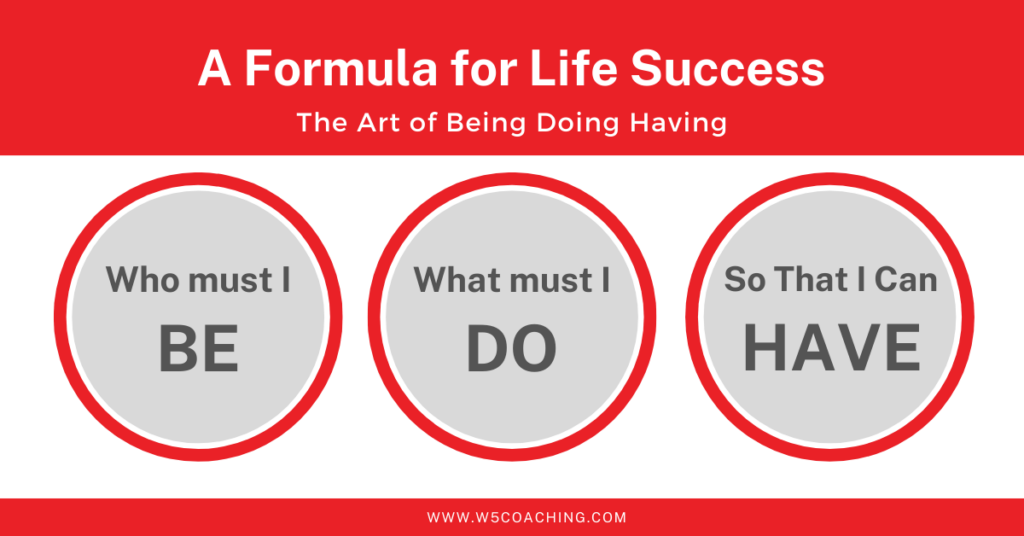Be Do Have: a formula for success

I’ve long lived by an adage I learned from Zig Ziglar:
“You’ve got to BE before you can do and DO before you can HAVE.”
In short, you have to be a person of character and do the right things, and then you can have the things you really want.
For owners who want to have successful businesses – this comes down to 3 steps.
1. You have to BE a successful business owner
BEing is an identity-level shift.
You see yourself as a successful business owner, you feel like a successful business owner, you develop the mindset of a successful business owner.
You take on the role of being a successful business owner FIRST.
What are the qualities of a successful business owner?
Consider: confidence, decisiveness, integrity, resourcefulness, generosity, ability to motivate themselves, a drive for achievement, a strong work ethic, willingness to learn.
These are the qualities that will allow you to DO.
2. You DO the things that a successful business owner does
From your identity and mindset of being a successful business owner, you can ask: what does a successful business owner DO?
You may find it helpful to look at other successful business owners to see: what do THEY do?
The successful business owners I work with do these things:
- Manage their time well. They’re organized and productive. They delegate.
- Lead their teams. They develop systems for their employees to follow. They hold daily huddles. They get good at hiring and recruiting.
- Make a profit. They’re good at bringing in money with marketing and sales. They’re also good at reading their financials and tracking their KPIs.
All of these are learnable skills.
3. You HAVE the things that a successful business owner has
A successful business is one that gives the owner the life they want. This includes:
- Money to spend on the things they want
- Time to enjoy their success with family and friends
- Pride in creating a profitable business
How to get started
Here’s simple exercise:
1. Draw two vertical lines to make three columns on a sheet of paper.
2. At the top of the left-hand column, write BE; in the middle column, write DO; and over in the last column, write HAVE.
3. In the right-hand column list all the things you really want in life or in business. Education? Good family relationships? A beautiful new home? A luxury automobile? A trip around the world? To lose weight?
4. Work your way down the center column identifying the things that you have to do in order to have the things listed in the right-hand column. As an example, let’s say you want a successful marriage. Ask: what do happily married partners do? Share their innermost thoughts and concerns with their mate? Encourage them when they are down? Remember special occasions? Everybody’s list varies because each of us has unique needs, beliefs, and interests. However, the formula remains the same.
5. Go to the left-hand column and identify who you have to BE in order to DO so that you can HAVE. If you want a successful marriage, perhaps you need to be faithful, attentive, loving, caring, helpful, empathetic, encouraging, persistent, committed, kind, thoughtful, considerate, and responsible. Not having all these qualities at this moment is okay, because they’re all skills, and skills can be developed.
You can use the Be-Do-Have formula for anything you want in life
You can use this basic formula for whatever it is you want to have.
Look at what you have to do in order to accomplish your objectives, and then examine yourself and determine what kind of person you have to BE in order to DO so that you can HAVE.
When you’re ready to BE a high performing business owner, you’ll recognize that hiring a coach is the first thing to DO so that you’ll HAVE a business that runs smoothly, profitably, and mostly without you. 😉
You can book an exploratory call with me here: book time with John

Build a Self-Managing Company
How to build a business that runs smoothly, profitably, and (mostly) without you.
Feeling stressed out and overwhelmed with a business that is taking all your time - and not giving you enough in return?
Are you finding it challenging to hire the right team (and get them to do the right things)?
I wrote this little guide for you!
Enter your details below to receive your free copy!
